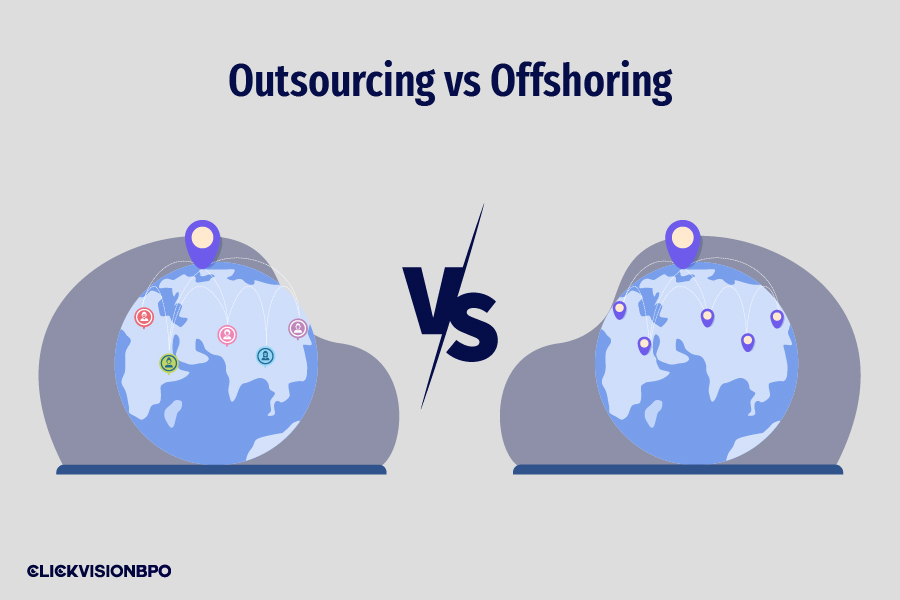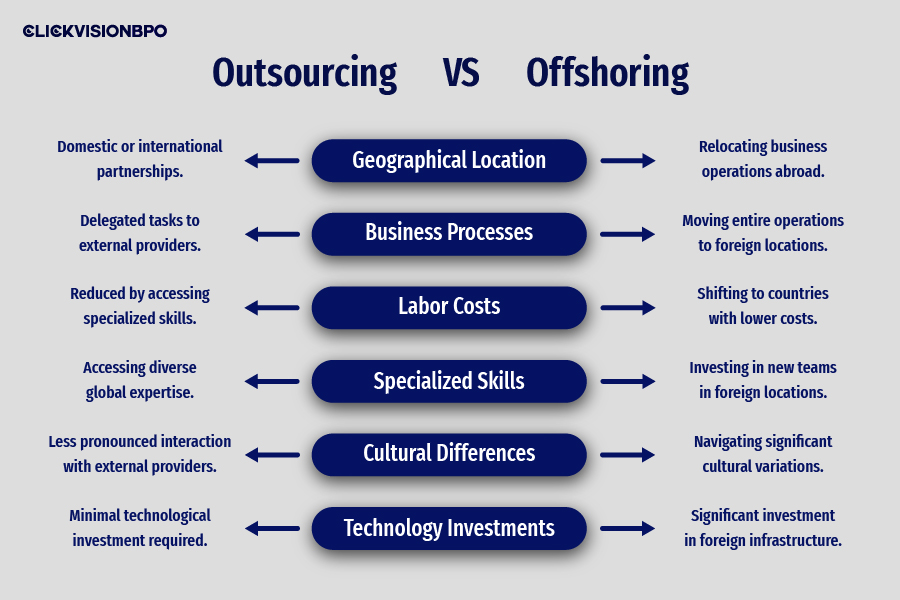Businesses opt for outsourcing and offshoring to cut costs and increase in scale. Outsourcing vs offshoring is one of the most misunderstood components of the global supply chain because they sound almost the same, and people think this is the same strategy. Yet, there is a difference between these two business practices. They can be distinguished by enlisting their characteristics.
Outsourcing vs Offshoring
Businesses choose between outsourcing and offshoring mainly to reduce costs. What is the difference between these two? Knowing their meaning is vital to find the solution that suits you best.
Outsourcing encompasses allocating functions to a third-party provider in your country or abroad. Businesses usually outsource to a country with lower standards to reduce costs. For example, your country can outsource to the Philippines or China. Outsourcing means you trust the external service provider with the less important operations while focusing on your core functions in-house.
Offshoring means moving all your processes and operations to other countries. For example, you open an in-house call center in India. Offshoring allows you to build a team of employees in another country to reduce operating costs and optimize profit.
Key Differences Between Outsourcing and Offshoring
How are outsourcing and offshoring different? The following are the main differences between outsourcing and offshoring.
Geographical location
One of the key differences between outsourcing and offshoring is the geographical location of the service providers. While outsourcing can be domestic and international, offshoring refers only to a global, cross-border contract. In outsourcing, companies may choose to partner with service providers within their own country. On the other hand, they may also choose international service providers.
In the case of offshoring, companies specifically relocate part of their businesses to a different country. The business may open and manage its facility (for instance, a factory) in a foreign country.
Business processes
Another important difference between outsourcing and offshoring is the scope of the business processes. Outsourcing means delegating specific tasks or functions to an external service provider. On the other hand, offshoring involves moving entire operations and services to a different location.
For example, you can outsource to the Philippines because a BPO company can do your customer service. In case of offshoring, you set up and operate a call center in a chosen country.
Labor costs
Labor cost is a key difference between outsourcing and offshoring. Outsourcing aims to reduce operating costs. Outsourcing certain tasks or processes to external service providers allows businesses to get specialized skills without investing in infrastructure or training. This is the main advantage of outsourcing – the ability to access cost-effective labor. For example, a U.S. company might choose to outsource specific tasks to a service provider in a low-cost country to reduce expenses.
On the other hand, offshoring involves relocating operations to a different country. Again, the goal is to move where costs are lower. Yet, offshoring aims to take advantage of the chosen country’s lower wages, taxes, or regulatory requirements. So, offshoring is actually a physical shifting of operations in a different country to enjoy the benefits.
Yet, remember that labor costs should not be the only reason when deciding between outsourcing or offshoring. It is essential to evaluate other aspects like quality control, communication, cultural differences, and time zone challenges. Sometimes, focusing solely on labor costs can lead to overlooking these other key factors that can impact the success of your project. So, you should find the right balance and consider the bigger picture.

Specialized skills
Specialized skills are an important factor that distinguishes outsourcing from offshoring. When a company outsources a task or project, it accesses diverse skills globally. Outsourcing enables organizations to use the expertise and abilities of professionals from different countries. This skill set might not be available in your country or cost more.
As you already know, offshoring means opening factories or offices abroad. So, again you use the specialized skills of certain people. So, we can say that outsourcing does not apply a direct investment in people, while offshoring means investing in new teams and building trust with them.
When you outsource, the agents handling your operations are not your employees, while when offshoring, you have employees.
Cultural differences
The cultural differences between outsourcing and offshoring are another factor to consider, especially if we talk about offshore outsourcing and offshoring. You must be ready to face cultural differences when offshoring since you will be setting up your business in a different country. For example, opening a call center in the Philippines means that you need to understand their culture, practices, traditions, and even holidays.
Here are some key influences of cultural differences:
- Communication
Effective communication is crucial in every work organization, including when outsourcing or offshoring. Cultural differences influence communication styles and understanding of work instructions. Language barriers and different accents can lead to misunderstandings.
- Management and leadership styles
Leadership and management are different across cultures. Some cultures may adopt a hierarchical management style, while others may practice a decision-making style when everyone is encouraged to participate and make decisions.
- Time zones and working hours
Besides culture, geography also plays an important role in miscommunication. Different time zones can be a challenge for effective communication. That is why we recommend creating overlapping shifts to allow real-time collaboration between teams located in different time zones.
Technology investments
Technological investment is among the factors distinguishing outsourcing and offshoring.
Outsourcing does not require investing in digital tools and technology. On the other hand, offshoring requires investing in modern technology to keep your business running. When you open a factory or a facility in a foreign country, you must invest in equipment, machines, computers, etc. You are also responsible for maintaining and upgrading your systems.

Conclusion
To conclude, although outsourcing and offshoring may sound like synonyms, there are several differences between these processes, and you must decide what is better for you based on the characteristics of each process.
The most significant factors that define outsourcing vs offshoring are geographical location, type of business processes, labor costs, specialized skills, cultural differences, and technological investments.

With a strong background in the marketing industry and healthcare leadership roles, Filip is responsible for CLICKVISIONBPO’s sales strategies and onboarding new clients. With a passion for sharing insights gained from his experience, he also shares valuable knowledge through industry related articles.
